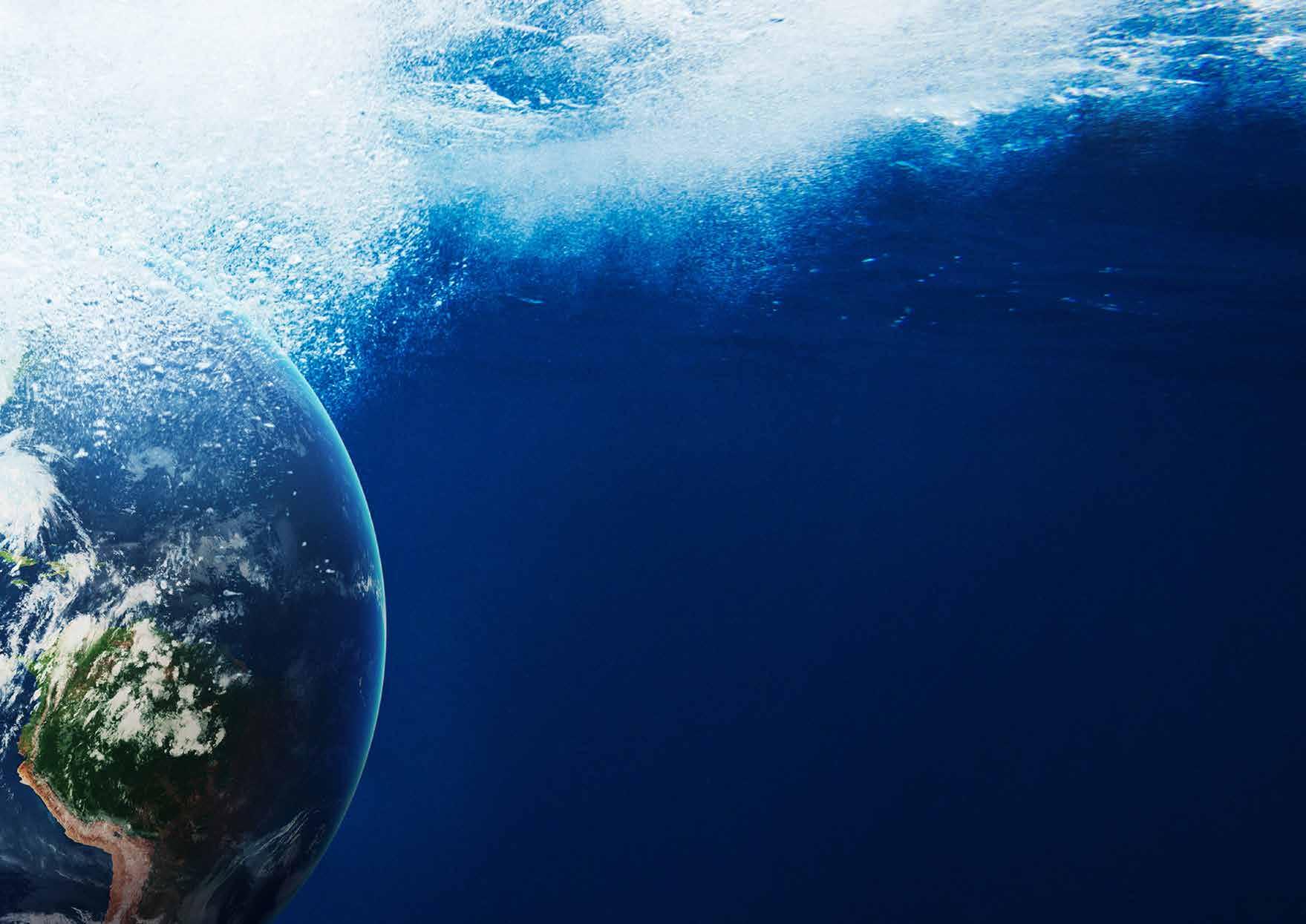

ESG
INTRODUCTION
Welcome to Uni-Tankers’ second annual ESG Report, included as part of this year’s Annual Report and available as a separate document. This report outlines the Group’s positions, policies, and recent progress on work with the environment, social aspects of our business and corporate governance.
Through case stories and highlighted initiatives, this year’s report also draws attention to Uni-Tankers’ strategic focus on decarbonization, diversity, equality and inclusion (DEI), work to fight corruption, and building a clear ESG governance structure.
ESG is an integral part of Uni-Tankers’ corporate strategy and embedded in the Group’s everyday operations. The Group’s sustainability performance is important not just to the company itself, but also to its parent company, USTC. As a values-driven company, Uni-Tankers is proud of its commitment to go above and beyond mere compliance, and to lead the way in the ESG areas where the Group knows it can make a genuine difference.
With the first ESG Report (2021/22) serving as a baseline, this and future ESG Reports enable the Group to track its progress from year to year. Executive Management looks forward to using the report as a basis for implementing new initiatives and to continuing the important work of monitoring progress and making continuous improvements.
For details on the definitions and accounting principles that inform this report, please see below (page 54).
CSR data required under Section 99A, B, and D of the Danish Financial Statements Act has been incorporated into this report.

Per Ekmann CEO

Thomas Thomsen CFO
33% WOMEN IN BOARD POSITIONS 90% RETENTION RATE
SHORE-BASED EMPLOYEES 92% RETENTION RATE
SEAFARERS

ENVIRONMENT
FIGHTING CLIMATE CHANGE AND POLLUTION
Bunker fuel consumption is the primary source of CO2 , SOX and NOX emissions at Uni-Tankers, and these emissions have negative impacts on climate change and air quality. In 2022/23, the Group worked both to reduce fuel consumption and to further explore using new alternative fuels on Uni-Tankers’ vessels. The Group did see an increase of 6% in emissions from bunker fuel consumption during the financial year, but this is mainly attributable to a 9% increase in the number of vessels in operation from 37.8 in 2021/22 to 41.4 in 2022/23.
The Energy Efficiency Operational Indicator (EEOI) is a measure for how efficiently a ship carries cargo in CO2 emitted per quantity carried and distance sailed. During 2022/23, the Group succeeded in operating its vessels more efficiently, which is reflected in a reduction in ratio of CO2 (M) from 40.7 in 2021 to 38.6 in 2022.
Uni-Tankers is always looking for opportunities to reduce the environmental footprint of the Group’s 35 owned and time-chartered vessels. As of the end of the 2022/23 financial year, the Group had installed fuel-saving technologies on 11 out of 15 owned vessels — up from 7 vessels in 2021/22 and resulting in fuel savings of 8 15% One fuel-saving initiative undertaken during the year involved applying a high-performance nano-modified epoxy coating to M/T Fenno Swan, which is expected to save fuel by reducing friction. A fuel-saving additive was tested on M/T Alsia Swan and showed fuel savings of 8 10%, and fullscale testing on an additional vessel in 2023/24 will be
conducted to verify these results.
A total of 13 Uni-Tankers vessels are now fully compliant with the IMO’s Energy Efficiency Existing Ship Index (EEXI), and the Group’s remaining 2 vessels will achieve compliance well ahead of the annual surveys in 2023.
Looking ahead to early 2023/24, B30 biofuel testing will be conducted on Uni-Tankers’ vessels in collaboration with the Bunker Holding Group, and it has been decided that the Group’s headquarters in Denmark will transition from on-site gas heating to district heating by 2025 to help reduce emissions from onshore activities.
PROTECTING BIODIVERSITY
Marine ecosystems and the biodiversity they support can be negatively impacted by shipping-related activities — especially spillage of bunker fuel, oil, and chemicals.
Uni-Tankers maintains a goal of zero spills across its fleet and works to meet this goal by complying with all applicable regulatory requirements and participating in a range of audits to ensure compliance. The Group continues to conduct monthly spill drills (SMPEP) and other crew training, along with annual spill exercises carried out with the help of outside consultants. Spill equipment is installed onboard all Uni-Tankers vessels, and all owned and time-chartered tonnage is CDI and/or SIRE vetted.
During 2022/23 the Group executed a controlled discharge (cargo jettison categorized as spill) to protect the crew and the vessel from the risk posed by unstable cargo.
In addition to spills, untreated ballast water, toxic coatings,
some oils and chemicals, and physical impacts of anchor and propeller functionality can negatively affect marine biology. Uni-Tankers mitigates these risks by equipping vessels with UV-light ballast treatment systems and compliant antifouling systems, and by using biodegradable (EAL) and whitelisted chemicals.
In 2022/23, the Group installed ballast water treatment systems (BWTS) on three additional vessels, M/T Falstria Swan, M/T Fionia Swan, and M/T Endelo Swan — meaning that all of Uni-Tankers’ owned vessels are now BWTSequipped.
All Uni-Tankers vessels continue to comply with safe-anchoring requirements, and hull and propeller cleaning is conducted when needed using non-abrasive methods that minimize negative impacts on marine ecosystems.
WASTE MANAGEMENT
Most waste generated by Uni-Tankers’ activities derive from tank residues and engine sludge. The Group aims for continued compliance with applicable MARPOL waste-management regulations and remained fully compliant during the 2022/23 financial year. Looking ahead, plans were made to map out ports where waste treatment facilities are available and implement “green port” recycling policies.
On shore, the Group is committed to reducing the negative impact of waste via environmentally sound waste-disposal methods. In 2022/23, a new plan for waste management at Uni-Tankers headquarters in Denmark was rolled out.
WATER MANAGEMENT
Most water consumed on board Uni-Tankers’ vessels is “technical water” used for tank cleaning. This water is primarily produced on board vessels and only sourced from shore if needed.
Fresh drinking water is mainly produced on board. If this water is not drinkable, or if the trade prohibits producing enough water, the Group sources bulk fresh water or desalinates seawater, as opposed to buying water in plastic bottles, wherever possible.
For 2022/23, Uni-Tankers set a goal of reducing the amount of water used on board its vessels through efficient cleaning practices. To help optimize these practices, a supercargo was appointed to assess cleaning plans on all owned and time-chartered vessels.
Late in the financial year, the Group also hired a performance analyst to monitor vessel performance and support the optimization of fuel and water consumption for the Group’s owned and time-chartered fleet by analyzing and validating operational data to help improve fleet efficiency, reduce CO2 emissions and fuel costs.
VESSEL RECYCLING AND SCRAPPING
Uni-Tankers is committed to following the Hong Kong International Convention for the Safe and Environmentally Sound Recycling of Ships (IMO Convention).
The Convention aims to make sure that ships do not pose any unnecessary risks to human health, safety or the environment when recycled at the end of their operational lives.
VALUE CHAIN IMPACTS
Purchasing spare parts, consumables and other goods and supplying these to Uni-Tankers’ vessels impact the environment.
To reduce negative impacts, the Group continues where possible to refurbish existing parts instead of buying replacements and to optimize its logistics setup.
In 2022/23, the Group relocated warehouse facilities closer to port areas and achieved a 19% reduction in emissions from freight, mainly due to a reduction in air freight.

“We are very pleased to release this second annual Uni-Tankers ESG Report. Executive Management has set ambitious goals for our ESG performance this year, and the whole Uni-Tankers team has pulled together to make real, meaningful progress across many departments and activities. It is also gratifying to be able to start comparing our performance this year with the baseline we established in 2021/22 – and to report that significant progress has been made.”
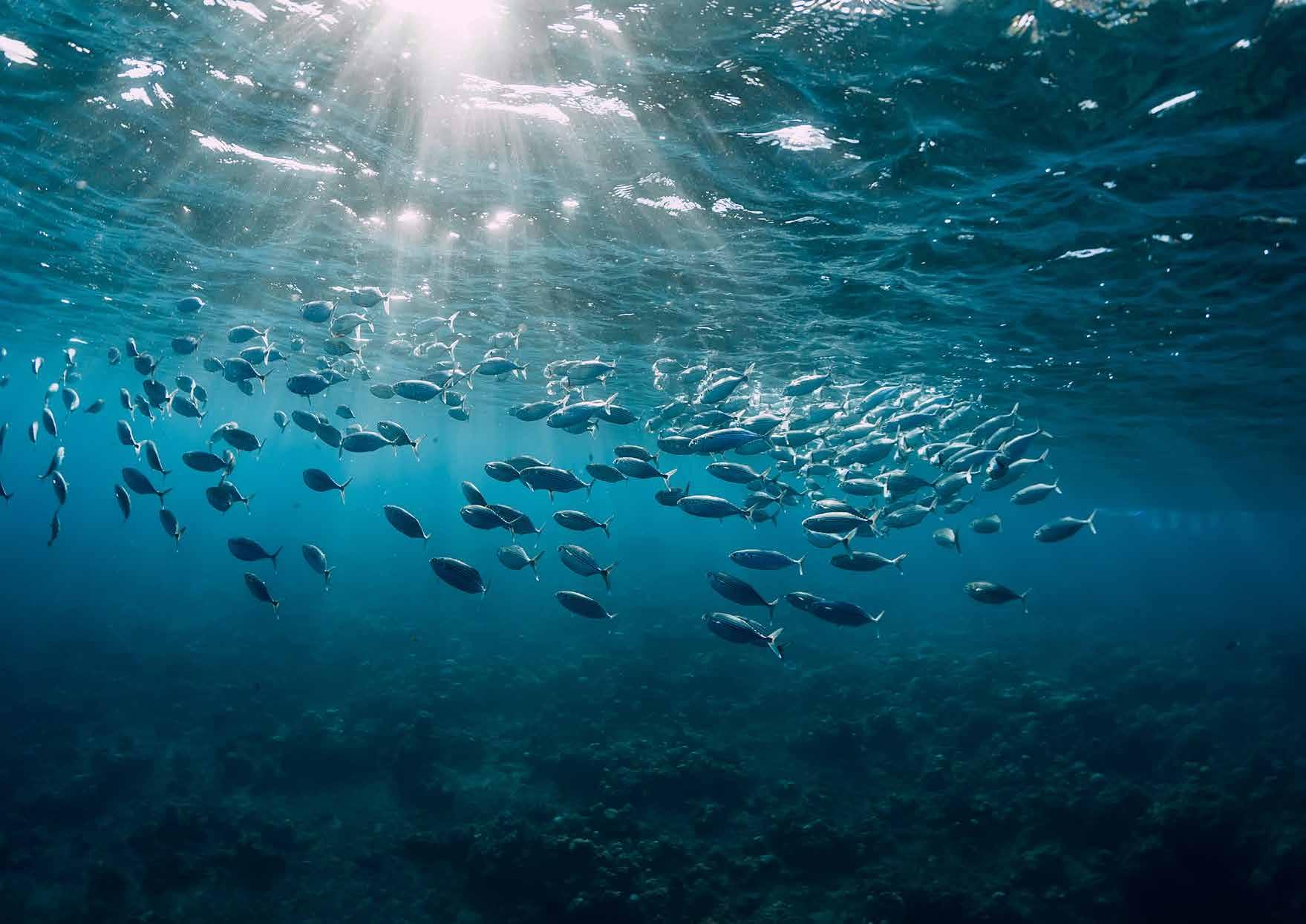
THOMAS THOMSEN, CFO
A STEADFAST COMMITMENT LETTER FROM OUR CHIEF GOVERNANCE OFFICER
Within USTC, the seeds of ESG took root long ago when our group was founded. Over four decades, the challenges have evolved, and the language has transformed, yet our unwavering commitment to create a positive impact and foster a vibrant company for our colleagues, business partners today, and the generations to come remains resolute.
In the USTC Group, much of the ESG agenda is managed individually by our subsidiary companies, where each management team assumes ownership of the path ahead. This tailored approach is necessary as ESG challenges vary for each entity.
Uni-Tankers has done an outstanding job on building a meticulous data-driven approach to attacking the challenges of its industry. As an important part of the world’s maritime trade route, the company has a unique opportunity to drive positive change in terms of the green
transition, diversity and other important topics. This work is most certainly now benefiting our ESG work.
The initiatives taken by Uni-Tankers are closely aligned with the overall direction set by USTC’s four prioritized topics:
REDUCING OUR CO2 EMISSIONS
Given our significant footprint, it is imperative that we influence and minimize our carbon impact. We aspire to be a driving force behind transformative changes. As sustainable fuels are being developed, our focus lies in scaling their adoption, advancing engine technology, bolstering infrastructure, and navigating pricing complexities. We have set our companies a difficult task as the path is not crystal clear. We recognize, however, our important role in this transformation.
FOCUSING ON DIVERSITY, EQUALITY, AND INCLUSION

Traditionally, the shipping industry has been characterized by conservatism and male predominance. To foster change, we strive for a more balanced gender distribution. As a first step, we have made adjustments to the boards of all our companies, including Uni-Tankers, and set a target of 60/40 representation for Tier 1 and Tier 2 positions within our organization.
STRENGTHENING OUR COMPLIANCE
In an increasingly complex world, we embrace the responsibility of being exemplary global citizens. This entails full compliance with rules, regulations, and industry best practices across all sectors we operate in. Establishing robust structures and processes serve as our foundation, providing stakeholders with tangible evidence of integrity.
SETTING UP A CLEAR GOVERNANCE STRUCTURE
Our long-term ownership gives us a solid foundation in terms of governance. Moreover, we have established ESG councils throughout the group, facilitating informed decision-making when required. Our aim is to maintain strong leadership teams across all entities, empowering them to make decisions that consistently align with our family values.
As we move forward, we intend to be open, transparent, and honest about our challenges, our processes, and our successes. We will press on step by step to embark on this journey, and we extend our gratitude to all stakeholders who accompany us on this path of progress.
Sincerely,
Mia Østergaard Rechnitzer Chief Governance Officer, Owner
“Our long-term ownership gives us a solid foundation in terms of governance. Moreover, we have established ESG councils throughout the group, facilitating informed decision-making when required.”
MIA ØSTERGAARD RECHNITZER, CHIEF GOVERNANCE OFFICER, OWNER




DECARBONIZATION IS ON EVERYONE’S LIPS AND UNITANKERS IS NO EXCEPTION
The shipping industry is accelerating its efforts and preparing for a decarbonized future, following the increasingly stringent global and regional regulations aiming to reduce greenhouse gas emissions and carbon intensity.
Uni-Tankers is a leading tanker shipping company trading in the intermediate and small tanker segment, moving goods vital to everyday life across millions of nautical miles each year. The Group embraces the responsibility that playing such an essential role in global shipping entails.
96% of Uni-Tankers’ emissions derive from fuel consumption on the Group’s owned and time-chartered vessels. During 2022/23, the Group established a decarbonization roadmap with assistance from leading external consultants. The roadmap has identified key levers to meet regulations and decarbonize the operations.
In the short term, onboard energy-saving technologies play an important role in Uni-Tankers’ decarbonization pathway and serve as a cost-competitive, fuel saving lever.
Decarbonization towards 2050 will require the adoption of clean fuels, both bio-based and synthetic, that emit less CO2 on a well-to-wake basis. In addition to this, the next generation of vessels will need to have dual-fuel technology installed.
In terms of future fuel pathways for the intermediate and small tanker segment:
Methanol is a promising, alternative fuel pathway for Uni-Tankers based on its technological readiness, safety aspects, and total cost of ownership.
LNG is an emerging alternative fuel but faces methane-slip issues and will therefore likely not comply with regulations.
Ammonia is gaining ground in some shipping segments but faces toxicity and safety challenges as well as unresolved engine availability.
In 2023/24, Uni-Tankers will set targets and finalize the decarbonization roadmap based on the outcome of the MEPC 80 session in July 2023, where the IMO is set to adopt its revised greenhouse-gas emissions strategy.
“At
Uni-Tankers, we aim to contribute to environmentally sustainable and climate-resilient development in the industry. Decarbonization is at the top of our strategic agenda, and our current focus is on establishing a decarbonization roadmap illustrating how and when we plan to decarbonize our operations.”

LISA CLEMENT JENSEN, HEAD OF STRATEGY
GREENHOUSE GAS EMISSIONS
(Scope 1)
(Scope 1)
Space 1
emissions (Scope 2) — Market based
Space 2
1
(Scope 2) - Market based
Space 2 Indirect emissions (Scope 2) Location based
Space 3
Space 3 Other indirect emissions (Scope 3)
Space 4
Space 5
Space 4
5
Space 2
emissions (Scope 2) - Market based
(Scope 2) - Location based
emissions (Scope 2) - Location based
Space 3
(Scope 3)
Space 4
Space 5
(Scope 3)
n Average number of vessels 2022/23 = 41.4 (37.8 in 2021/22) a 9% increase, mainly driven by expansion of fleet.
n Despite increase in direct emissions, carbon intensity (AER, CII and EEOI, pages 29-32) is following a downward trend.
n Direct and indirect emissions from vessel bunker consumption represent 96% of total emissions.
n Transport work (nautical miles x DWT) performed is 8% more in 2022/23, consistent with expansion of fleet.
1)
2)
3)
4)

ENVIRONMENT
1)
2)
3)
4)
5)
2) Accounting pr nciples for Scope 3 emissions in Definitions and Principles (page 54).
3) Due to COVID-19, travel activities were reduced in 2020/21
4) COVID-19 instability n supply chains has impacted freight coordination
Annual efficiency ratio (AER) Entire fleet
From 1 January 2023, ship energy efficiency management plan (SEEMP) part III was effectuated by the IMO. The purpose of SEEMP is to provide ship owners with tools to meet 2030 and 2050 goals for reduction of greenhouse gases
With the effectuation of part III came initiative CII - carbon intensity indicator CII is applicable for vessels over 5,000 GT and is a monitoring tool and KPI for reaching IMO's targets for greenhouse gas emission reduction in 2030. CII is based on AER (annual efficiency ratio) and measures how efficiently a ship carries cargo in CO emitted per cargo-carrying capacity and nautical mile. AER is corrected with shipspecific adjustments from which the attained CII is calculated.
The IMO is working with 2008 as a baseline year for a 40% reduction in carbon intensity in 2030, but for pragmatic reasons reference year is 2019. 2019 was the first year consumption data was systematically collected by IMO via the IMODCS reporting From the collected 2019 data and the IMO's historic research a reference formula was created from which you can derive a vessel's 2019 carbon intensity baseline based on ship type and size. From 2019, a yearly percentage reduction in carbon intensity has been defined by the IMO, so far until 2025 where total reduction is 9%. To meet the current 2030 trajectory set out by the IMO a total reduction of 21 % on 2019 reference figures is expected.
For the purpose of comparing both owned and chartered fleet and all ship sizes, AER will be compared against baseline.
Uni-Tankers' current 2030 trajectory:
n Carbon intensity baselines and AER fluctuate with fleet composition, which is to be considered when assessing development.
n Carbon intensity for 2022 fleet was: 10.4% below corresponding 2019 baseline.
7.4% below corresponding 2022 baseline.
n Carbon intensity for 2021 fleet was: 11.4% below corresponding 2019 baseline.
9.7% below corresponding 2021 baseline.
n While 2022 fleet is still well below the IMO trajectory, there is a decrease in efficiency from 2021 fleet to 2022 fleet.
Carbon intensity indicator (CII) own fleet
CII is based on AER (see page 29), but with correction factors for ship type and ice class and also operational deductions for heating, cargo pumps, and dangerous navigation (ice and piracy). When all correction factors and deductions have been applied, the annual attained CII has been calculated
CII is divided into categories from A to E with A being the best and E being the worst. To be compliant, the annual attained CII must be in category C. If the annual attained CII is in category D or E, measures must be implemented to bring vessel back to category C
The IMO is working with 2008 as a baseline year for a 40% reduction in carbon intensity in 2030, but for pragmatic reasons reference year is 2019. 2019 was the first year consumption data was systematically collected by IMO via the IMODCS reporting. From the collected 2019 data and the IMO's historic research a reference formula was created from which you can derive a vessel's 2019 carbon intensity baseline based on ship type and size From 2019, a yearly percentage reduction in carbon intensity has been defined by the IMO, so far until 2025, where total reduction is 9% To meet the current 2030 trajectory set out by the IMO a total reduction of 21% on 2019 reference figures is expected.
Even though it is only applicable for vessels above 5,000 GT, Uni-Tankers has chosen to be compliant on its entire owned fleet
Uni-Tankers' current progress:
n CII baseline and attained CII fluctuate with fleet composition, which is to be considered when assessing development.
n Carbon intensity for reporting year 2022 is 14% below reference line.
n Carbon intensity for reporting year 2021 is 16% below reference line.
n While fleet is still well below CII trajectory there was a decrease in fleet efficiency from 2021 to 2022.
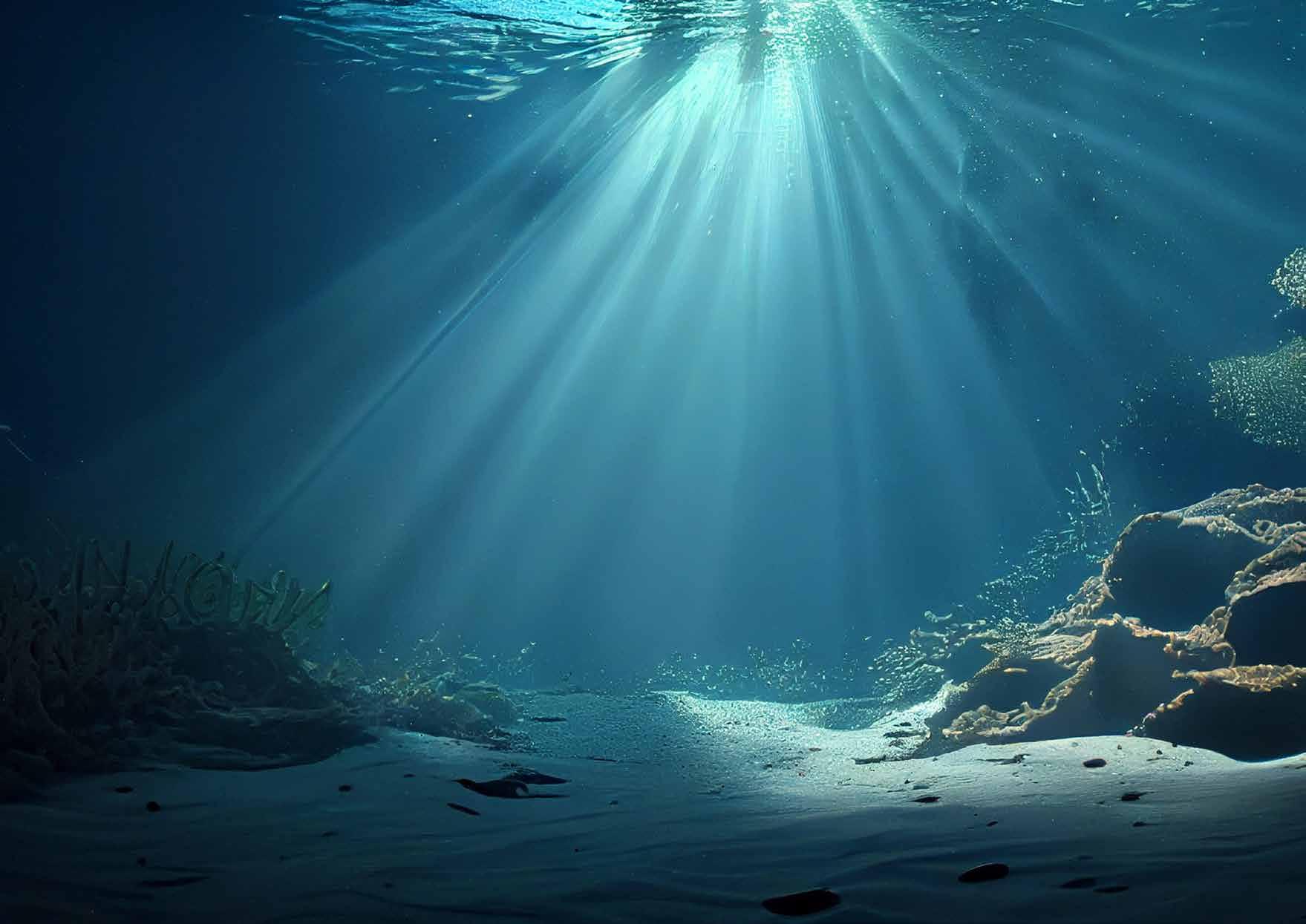
FOOTPRI2NT
REDUCING OUR FOOTPRINT
Since 2014, we have worked diligently on reducing our overall footprint. We continuously raise the bar for our operations and during 2022/23 we initiated several projects to become more energy efficient:
• Fuel saving technologies installed on 73% of the owned fleet, resulting in fuel savings of 8—15%.
• High-performance nano-modified epoxy coating applied to M/T Fenno Swan expected to save fuel by reducing friction.
• Fuel-saving additive tested on M/T Alsia Swan showing fuel savings of 8—10%, and full-scale testing on an additional vessel in 2023/24 to verify the results.
ENVIRONMENT
CARBON INTENSITY
EEOI entire operated fleet
Energy efficiency operational indicator (EEOI), like AER (CII), is a measure for how efficiently a ship carries cargo in CO emitted per quantity on board and nautical mile.
Instead of calculating using vessel's cargo carrying capacity, it is calculated using the weight of cargo on board. This method weighs ballast voyages and part loaded voyages utilization into the calculation.
EEOI is to a higher degree than AER an indicator of how well you utilize your vessels cargo-carrying capacity while still being affected by the technical efficiency and capacity of the vessels.
Ballast voyages
Uni-Tankers' current progress:
1 EEOI reduced by 12% since 2019.
2 Technical efficiency relative to vessel size improved by 11% since 2019. Reduction achieved through optimization of owned fleet and more efficient chartered tonnage.
3 Number of ballast miles have been reduced by 1.5%.
4 Average cargo-tank utilization has declined from 2019 to 2021 but improved again in 2022.
Part-loaded voyages utilization
ENVIRONMENT
SOCIAL
HEALTH, SAFETY, AND SECURITY (HSS)
Ensuring the health, safety, and security (HSS) of all Uni-Tankers employees remains the Group’s top priority. This task can be challenging, particularly due to the nature of work conducted on vessels, which encompasses cargo handling, maintenance and operating in an offshore environment — sometimes in remote areas.
HSS is a highly regulated area of shipping, and many industry and customer standards for ensuring HSS are considered basic requirements. By receiving monthly reports on “unsafe conditions”, “unsafe acts”, and “near-misses” from all owned vessels, Uni-Tankers can evaluate and address conditions that have the potential to cause future accidents, thereby proactively enhancing safety.
In 2022/23, Uni-Tankers continued to optimize and enhance its HSS policies and practices through a variety of initiatives. Performance appraisals of all officers were conducted in January 2023, and a capability matrix was established for the Top 4 on all owned vessels. In addition, a full 90% of Top 4 officers received stress-management training at the Group’s Senior Officers’ Conference.
The transition to SIRE 2.0 inspections was also an important topic at the Senior Officers’ Conference. Uni-Tankers is now reviewing the new protocols to prepare for implementation in late 2023.
SIRE 2.0 places considerable emphasis on human factors, and Uni-Tankers has already assigned two marine advisors to circulate among its vessels and provide introductions and training. All senior officers, junior officers, and ratings have received comprehensive SIRE 2.0 training during Crew Conferences held in the first quarter of 2023, and work is underway to fully prepare all relevant Uni-Tankers employees to ensure a smooth transition to SIRE 2.0, for Uni-Tankers and its customers.
For onshore staff, a “listen, engage, act and participate” (LEAP) employee-satisfaction survey was conducted, and 96% of Uni-Tankers’ employees replied. LEAP surveys are a useful tool for measuring engagement and learning what drives it. Throughout the year, all departments held workshops to understand and openly discuss the survey results and to further identify key focus areas to work on in their respective teams.
Uni-Tankers suffered no fatalities during the 2022/23 financial year. While lost-time incident frequency remained the same as the previous year, the Group did see an increase in reported near-misses. This can be partly attributed to a greater emphasis on encouraging crew members to report near-misses in compliance with our procedures and stated KPIs.
In addition to these measures, the Group continued to update its safety management system for Uni-Tankers’ crews and onshore staff. The system includes monthly onboard training exercises and an annual full-scale accident simulation exercise conducted with external parties.
RECRUITMENT AND EMPLOYEE RETENTION
Tanker shipping is a “people business,” where top-quality staff and great chemistry can make all the difference. The quality of Uni-Tankers’ employees and the Group’s work to prepare employees for advancement was validated in 2022/23, when two internal candidates received promotions — in competition with external applicants.
In 2022/23, the Group implemented a new recruitment process that promotes greater diversity. Elements of the new process include more accurate job ads that use gender-neutral language, the inclusion of both genders and different departments on recruitment panels, and the use of scoring cards and other interview techniques designed to ensure unbiased hiring.
Employer branding work was stepped up during the financial year, particularly via the new “Destination Possible” section of the Group’s website and accompanying employee portraits. To reach out to potential employees, Uni-Tankers representatives took part in job fairs at educational institutions for the first time.
In 2022/23, the Group’s employee retention rate increased and amounted to 85—99% for offshore staff and 90—95% for onshore staff.
EMPLOYEE RELATIONS
Uni-Tankers continues to foster strong relations between on- and offshore staff, and to fully integrate our crews into the company. This work is conducted primarily via inperson meetings and modern online communication channels.
Highlights from the 2022/23 financial year included the Group’s regular Crew Conferences for officers and ratings, which covered a wide range of relevant topics. The Group also invited families of crew members along to dinner as part of the annual conference in Manila. Onshore–offshore relationships are very important at Uni-Tankers, and regular ship visits by management and onshore crew are conducted and automatically registered. During 2022/23 the number of ship visits inceased by 82 visits compared to 2021/22.
The Group’s commitment to the Charter for More Women in Shipping remained strong in 2022/23, and a number of new initiatives were taken during the financial year, including updated goals and policies supporting the underrepresented gender. In 2022/23, women accounted for 30% of Uni-Tankers’ onshore employees and 1.2% of offshore employees.
During the 2022/23 financial year, the Groups’ Board of Directors was reorganized and now consists of 6 members including two women and four men. The Board of Directors now consists of 33.3% women, thus Uni-Tankers has reached its targeted gender distribution during 2022/23.
As part of the gender balance policy for the Danish offices, the Group aims to have close to equal gender balance in tier 1 and 2 positions by 2030. Today that figure is 27.3% women and 72.7% men.
Beyond gender, career development plans were strengthened and, as part of this, two middle managers have attended a core leadership program intended to strengthen their management skills. Lastly, the “Destination Possible” employer branding campaign emphasized diversity and inclusion during the financial year.
LEARNING OPPORTUNITIES
DIVERSITY, EQUALITY AND INCLUSION
Uni-Tankers operates on the principle of “best person for the job” and does not discriminate against candidates based on gender, nationality, age, physical abilities, culture, race, political or religious beliefs, or sexual orientation.
It is Uni-Tankers policy and practice to provide health and safety, leadership, simulator and other training for its staff. These educational programs are critical for the Group’s work with ESG, employee development, and work to ensure that crews maximize the benefits of new vessel technologies.
Financial year 2022/23 saw a number of training initiatives
for staff at different levels, partly inspired by educational work at other USTC companies. These initiatives included ongoing leadership and stress-management training for Top 4 officers, as well as vessel-office rotation programs for two additional masters and chief engineers employed by the Group during the year.
HUMAN RIGHTS
Uni-Tankers’ risk of influencing human rights via its actions is estimated to be limited. The Group believes that all employees, irrespective of gender, nationality, skin colour, and religion must have equal career and management opportunities. Uni-Tankers is aware that the industry in which it operates is characterized by a high degree of diversity and therefore supports an open-minded and unprejuciced culture which allows each individual employee to make the best possible use of his/her skills.
The Group’s view on human rights is presented in the USTC Code of Conduct, which is available to all employees — who are expected to adhere to it. Moreover, Uni-Tankers continues to comply with the Group’s non-discriminatory behavior in recruitment processes by maintaining focus on professional and personal skills as the foundation for decisions.
Uni-Tankers has no reason to suspect that any violation of human rights has taken place during financial year 2022/23. In the coming financial year, Uni-Tankers will continue these efforts, and in addition the Group will intensify its work with GDPR.

DREAMS IN SIGHT! (DRØMME I SIGTE)
– TWO YOUNG WOMEN SAIL AROUND THE WORLD
On 9 July 2023, two young women will set sail from Copenhagen on a voyage around the world. Captain Leonora Valentin and diving instructor Sissel Therkildsen — both 25 years old — will spend more than four years sailing around the world alone. Well, not completely alone, as a big part of their adventure will be inviting guests on board to sail, dive and make memories for a lifetime.
A PURPOSE-DRIVEN SPONSORSHIP
Uni-Tankers is proud to serve as main sponsor for this adventure, which will be a once-in-a-lifetime opportunity for the crew and guests on board and also — we hope — inspire more women to set sail and perhaps even consider a career in the maritime industry. Encouraging women to consider a career in shipping, onshore or off, has been a strategic goal for Uni-Tankers for several years now.
PROTECTING MARINE BIODIVERSITY
A big part of Sissel and Leonora’s adventure is a heartfelt desire to protect marine biodiversity and inspire others to do the same — something Uni-Tankers is also working towards. By documenting marine life throughout their journey and sharing stories from all corners of the world, Sissel and Leonora hope to encourage people to consider a more sustainable approach to their everyday lives.
“LULU TAO”
Christened “Lulu Tao”, the boat that Leonora and Sissel will sail around the world is a Beneteau 50, designed by Bruce Farr. The 15-meter sailboat has been customized for the long voyage and is now furnished with advanced safety, navigation, diving and other equipment, including solar panels. With three double cabins in addition to a crew’s cabin for Leonora and Sissel, the boat offers plenty of room for guests on board.
Before setting sail, “Lulu Tao” will be in port in Copenhagen, where Uni-Tankers’ customers and employees will have a chance to see it in person.

“Uni-Tankers is proud to sponsor these two young women on their great sailing adventure around the world. Promoting gender diversity in the shipping industry has long been an important focus area for us, and we hope that Sissel and Leonora’s remarkable courage and passion will serve as a beacon of inspiration, encouraging more women to consider a career in shipping.”
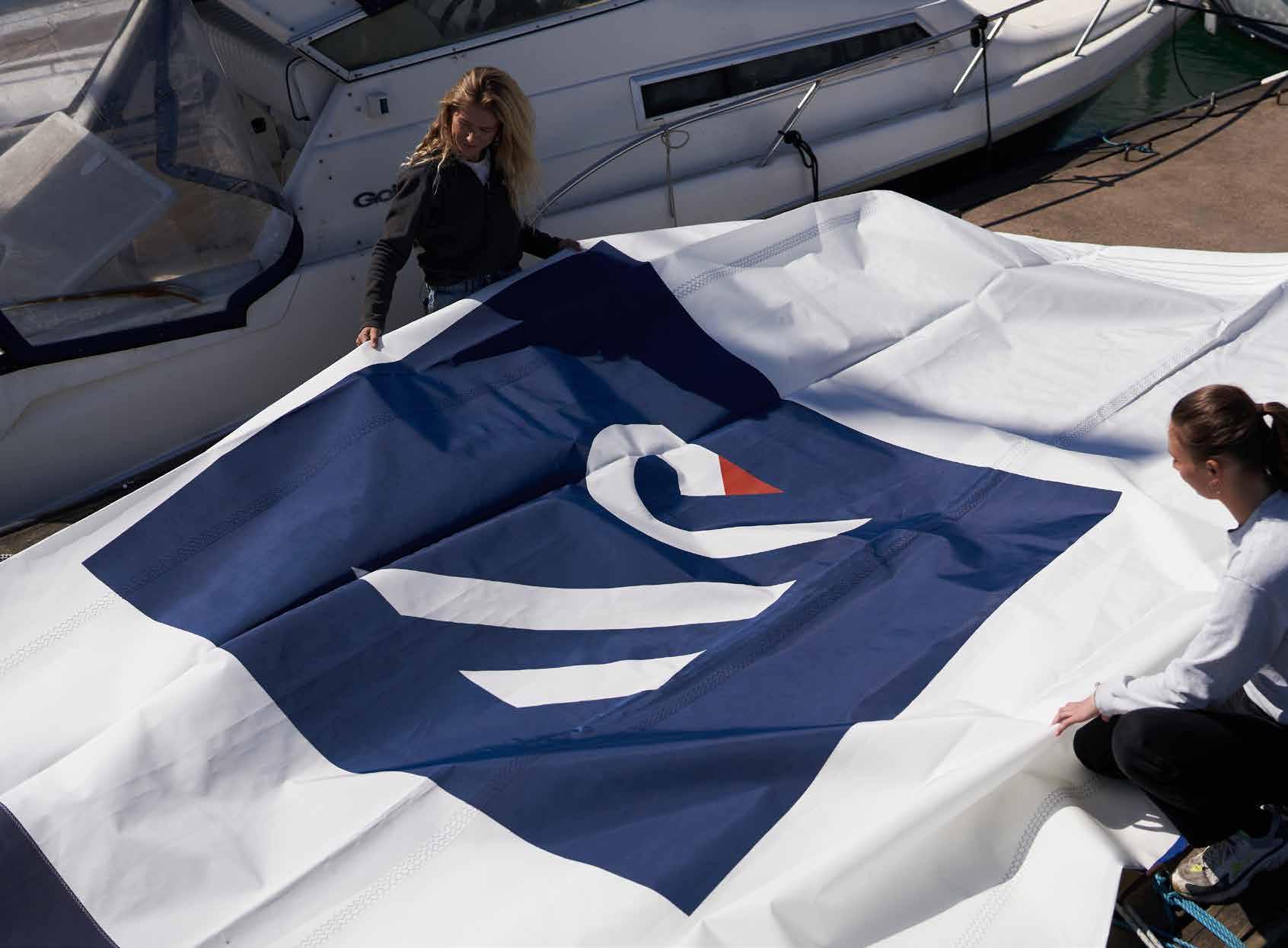
ANJA SKOV MYGIND, HR BUSINESS PARTNER
SOCIAL
1)
2)
4)
WOMEN IN BOARD POSITIONS
RETENTION RATE

UNI-TANKERS’ BOARD OF DIRECTORS WAS REORGANIZED AND NOW CONSISTS OF 33.3% WOMEN. UNI-TANKERS HAS THUS REACHED ITS TARGETED GENDER DISTRIBUTION IN BOARD POSITIONS DURING 2022/23.
3)

SOCIAL
Seafarers
nationality European nationalities
Other nationalities
Other nationalities
Shore-based
GOVERNANCE
COMPLIANCE
All Uni-Tankers’ compliance work is undertaken by the Group’s chartering team. When this team first engages with new clients and or commissions new voyages, they consult the Uni-Tankers Chartering Manual, which details the know-you-counterparty (KYC) and sanctionsrelated expectations, procedures and internal controls that apply. Furthermore, the Group is working to ensure that all Uni-Tankers’ trades involve sanctions screening, irrespective of the parties involved, origin, destination, or type of cargo.
Uni-Tankers operates in parts of the world where there is a higher risk of corruption. The Group is attentive to the risks of corruptive behavior and combats this by following the USTC Code of Conduct and complying with supplier and customer codes of conduct. In financial year 2022/23, the Group joined the Maritime Anti-Corruption Network (MACN).
Uni-Tankers operates in full compliance with applicable competition and anti-corruption laws, as well as relevant rules and legislations in the countries in which the Group operates. The Group’s Safety Management System underscores the importance of anti-corruption, stating that Uni-Tankers employees are prohibited from directly or indirectly offering, giving, soliciting, or receiving any form of bribe, kickback, or other corrupt payment.
In 2022/23, Uni-Tankers updated its policies and pro-
cedures across anti-corruption, sanctions and competition law, based on the results of a USTC Group-wide risk analysis. The new policies and procedures will be rolled out in 2023/24. The Group also reviewed its internal Code of Conduct/chartering manual and conducted one-to-one training sessions with relevant staff.
Regarding future regulations, Uni-Tankers is thoroughly prepared for the upcoming EU emissions trading system (ETS) allowances, which come into effect from 2024. Executive Management has also set up a task force to make sure the Group is ready for CSRD (Corporate Sustainability Reporting Directive), which is an EU legislation that requires all large companies to publish reports on their environmental and social impact. Companies must submit their report aligning with the CSRD in 2025.
DATA PRIVACY AND SECURITY
Uni-Tankers’ data privacy and security measures remain highly robust, and the Group works closely with the other USTC companies to further improve cybersecurity.
Key applications are hosted primarily on servers kept on the premises and operated by Unit IT, with some services hosted in the Cloud. Offshore, the Group is only responsible for data privacy and security on owned tonnage, and all offshore applications are run from a server located on the vessel itself, with backups taken daily.
During 2022/23, new data-related initiatives included the development of an action roadmap for IT security, data privacy and data ethics, the rollout of a training program on phishing, and improvements to vessel business conti-
nuity plans (BCPs). Readiness tests were conducted, and staff received training in a variety of specific areas. The Group also moved towards implementing a zero-trust policy across operations.
CORPORATE GOVERNANCE
Corporate governance is well established at Uni-Tankers, where the responsibilities of the Board of Directors, Executive Management and the Group’s owners are clearly delineated.
For all board meetings and meetings between Executive Management and the owners, strict meeting procedures are followed. There are clear reporting lines between the Group’s different business areas and Executive Management — including regular KPI reporting and monitoring.
In 2022/23, the Group’s corporate governance rules were mapped to Danish recommendations, and an ESG governance structure and a progress-tracking system were established.
The ESG governance structure includes clearly defined ownership across all ESG topics. Moreover, the Group holds quarterly meetings with key members of the USTC ESG council, enabling Executive Management to track progress and ensure alignment with the four prioritized topics and the overall direction set by USTC.
GOVERNANCE CHART
ENVIRONMENTAL Technical Director
BOARD OF DIRECTORS
Endorses the ESG strategy
Monthly meetings in category specific working groups to follow-up on actions and next steps.
Bi-monthly meetings with Executive Management, Owner, Co-driver, and Head of Strategy to track progress.
Quarterly meetings in Uni-Tankers ESG Council.
EXECUTIVE MANAGEMENT
Defines ESG strategy and oversees implementation
HEAD OF STRATEGY
Facilitates ESG strategy and enables category owners
SOCIAL
HR Business Partner + Crew Manager
Category-specific Governance
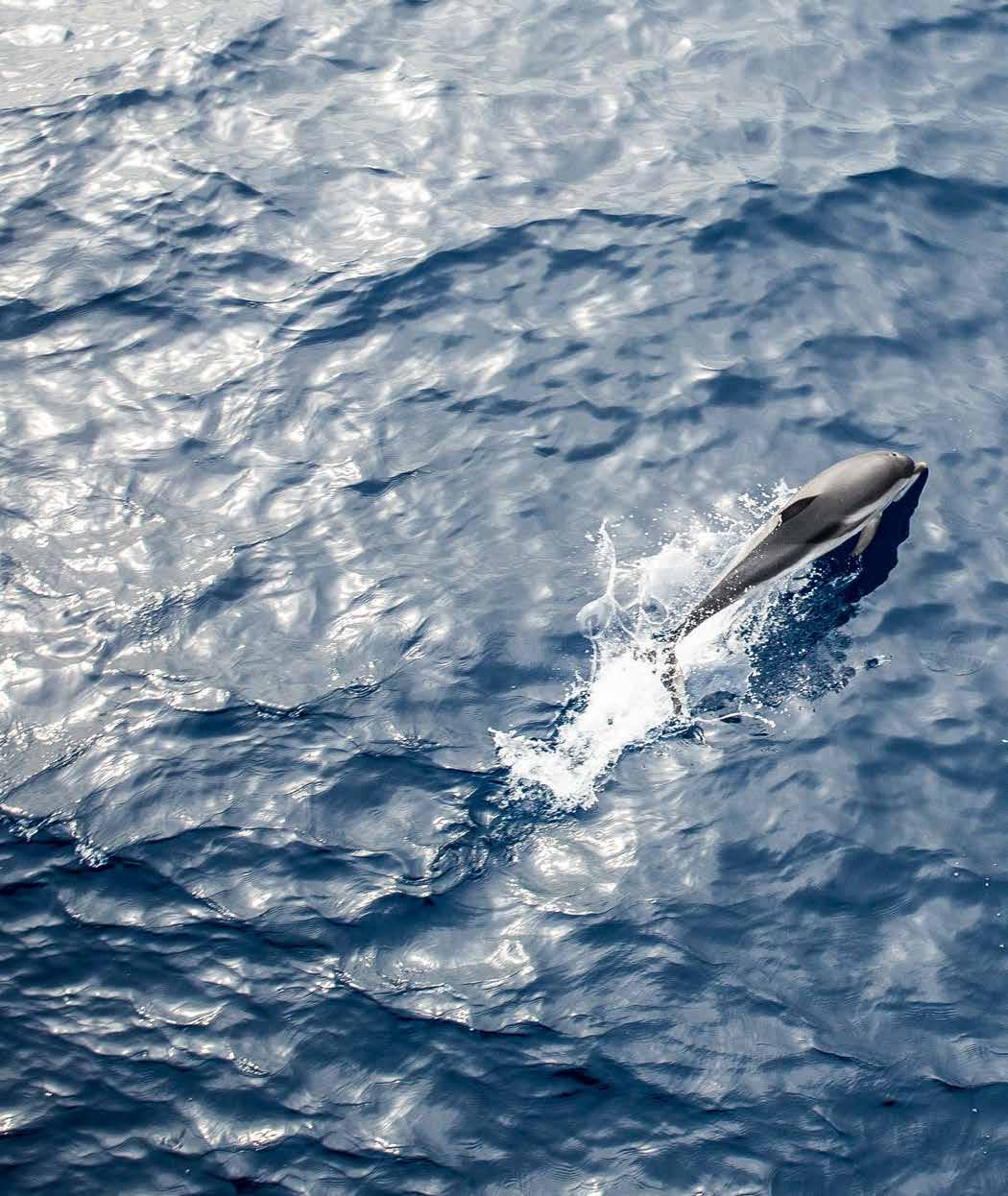
GOVERNANCE Finance Manager + Head of Strategy
“Environmental, social, and governance work is an integral part of our corporate strategy and imbedded in our everyday operations. As a values-driven company, we are proud of our commitment to be a responsible actor in the transition towards more sustainable shipping, and our data-driven approach ensures that we can track our progress and direct our efforts and investments to the most efficient measures.“

PER EKMANN, CEO
REPORTING AND HANDLING OF MISCONDUCT
Uni-Tankers continued to use parent company USTC’s whistle-blower system during the financial year. However, a company-specific system was also developed and has been rolled out for off- and onshore staff in April 2023.
In addition to these systems, crew members have a dedicated person ashore (DPA) they can turn to regarding misconduct, grievances or general concerns, and a supercargo serves as an informal channel for reporting misconduct.
In 2022/23, Uni-Tankers joined over 180 other companies as a member of the Maritime Anti-Corruption Network (MACN). In partnership with the shipping industry, governments and civil society, MACN works to stamp out corruption in the maritime industry and to promote more inclusive trade.
In 2022/23 the Group received zero reports of misconduct, and complaints about human or labour rights are also rare.
TRANSPARENCY AND REPORTING
Uni-Tankers continued to communicate more transparently about its ESG strategy, initiatives and progress during 2022/23 — with this report being one result of the Group’s work.
Because transparency and reporting depend on data availability and integrity, the Group continued improving the availability and quality of its ESG-related data during the
financial year. As of the 2022/23 financial year, all such data is now collected and processed in the Group’s Power BI system.
RESPONSIBLE TAX AND FLAGGING POLICY
At Uni-Tankers, all tax is consolidated at the USTC level, and USTC is ultimately responsible for tax reporting and payments. The Group is subject to the Tonnage Tax Scheme across its entire fleet and to ordinary company tax outside Denmark. Uni-Tankers continues to pay fair tax in all countries where it operates and to comply with the letter and spirit of the law.
In September 2022, M/T Samus Swan was put under the Danish flag, meaning that 93% of all Uni-Tankers’ owned vessels were flying EU flags at the end of the financial year.


A PROUD MEMBER OF MACN
Corruption is a major challenge for shipping companies in many parts of the world, and the Maritime Anti-Corruption Network is the industry’s leading anti-corruption organization. Founded in 2011, the network now counts 180 companies among its members.
MACN supports its members in combating many types of corruption, and its work has resulted in major positive outcomes, including reductions in demands for facilitation payments in the Suez Canal, new regulations in Argentina that make it more difficult for officials to demand bribes, and improved ease of operations in Nigerian ports.
CORRUPTION IS BAD BUSINESS
Corruption makes life difficult for vessel crews, with demands putting crew members in ethical dilemmas and sometimes even jeopardizing their safety. It also adds to the cost of shipping for shipping companies and, ultimately, customers. As much harm as it does, however, corruption is hard to fight alone. This is why Uni-Tankers joined MACN in 2022/23.
NEVER ALONE
With its emphasis on capability building, collective action and collaboration, MACN makes sure you’re never alone when dealing with corruption. Through its collective action projects, member companies work with stakeholders including port and customs authorities, NGOs, and local governments to undertake root cause analyses and implement “recommended actions” that remedy the problem.

“Crewmembers shouldn’t have to choose between things like illegal facilitation payments and costly delays, uncertainty, and even personal threats. And customers shouldn’t have to pay for corruption via higher rates. Our membership in MACN gives us a collaborative forum for fighting corruption at the root — which can ultimately reduce corruption around the world and, one day, stamp it out completely.”

HANS THORSEN, MANAGING DIRECTOR GLOBAL

30% WOMEN
CURRENTLY, WOMEN ACCOUNT FOR APPROXIMATELY 30% OF ALL UNI-TANKERS’ ONSHORE EMPLOYEES
GOVERNANCE
Space
Training
Space 1
Training courses completed Space
Training courses completed Space
Training courses time spent
Space 1
Different courses completed
space 12
Training courses time spent
Space 1
Training courses offered
12
Training courses offered
12
1)
3)
GOVERNANCE
GOVERNANCE
Trainings performed shore
Space 1
Trainings performed ship
Space 3
Phishing exercises performed shore and ship
Space 4
Phishing exercises failed — shore and ship
1) Current shore cybersecurity program was launched 11 October 2022 with an intro training course. Additional training course was initiated 1 February 2023 Data from prior cybersecurity program is not available.
2) Current ship cybersecurity program was launched 11 October 2022 w th 3 different training courses available 1 compulsory and 2 voluntary Data from prior cybersecurity program is not ava lable
3) Phishing exercises launched as a jo nt exercise between sh p and shore
4) Failed phishing exercise defined as click on link, opening attachment and entering data in link
DEFINITIONS AND PRINCIPLES
ENVIRONMENTAL DEFINITIONS AND ACCOUNTING PRINCIPLES
Financial year (FY) 2022/23 is the second year that Uni-Tankers has calculated its overall GHG emissions. The GHG emissions for Uni-Tankers are hereafter reported yearly and follow the company’s financial year, which runs from 1 May up to and including 30 April the following year.
GREENHOUSE GAS PROTOCOL
The carbon accounts from Uni-Tankers have been set up based on the standards as set out by the Greenhouse Gas Protocol (GHG Protocol). The GHG Protocol is an internationally recognized standard used to account for greenhouse gas emissions and is used by the majority of organizations reporting on their greenhouse gas emissions. The GHG Protocol covers the accounting and reporting of seven greenhouse gases that are covered by the Kyoto Protocol: carbon dioxide (CO2), methane (CH4), nitrous oxide (N2 O), hydrofluorocarbons (HFCs), perfluorocarbons (PFCs), sulfur hexafluoride (SF6), and nitrogen trifluoride (NF3).
Scope 1 emissions are all direct GHG Emissions, resulting from the activities of an organization or under their control. This includes emissions from mobile combustion and stationary combustion, such as fuel combustion by the fleet or vehicles, and onsite fuel combustion.
Scope 2 emissions are indirect GHG emissions related to electricity, heating, and cooling consumption. More specifically, emissions from electricity, district heating, and district cooling purchased and used by the organization. Emissions are created during the production of the energy and eventually used by the organization. The organization can control consumption, but they do not directly “own” the emissions.
Scope 3 emissions cover all other indirect GHG emissions. These emissions cover what is emitted in the organization’s value chain, both upstream and downstream activities. What is included in scope 3 emissions is up to the organization to decide for itself and depends on the relevance of each of the activities as well as what information is available or can be estimated.
GHG ACCOUNTING PRINCIPLES
CHANGE OF ACCCOUNTING MANUAL
To determine which emissions are categorized in each Scope, Uni-Tankers has chosen to consolidate its emissions following the operational control approach. “Under the operational control approach, a company accounts for 100 percent of the GHG emissions over which it has operational control.” According to the GHG Protocol, “the company has operational control if itself or one of its subsidiaries has the full authority to introduce and implement operating policies.” It does not account for GHG emissions from operations in which it owns an interest but does not have operational control.
Emission figures for earlier years have been revised due to discovery of data inconsistency.
BUNKER FUEL COMBUSTED BY OWNED AND TIMECHARTERED VESSELS (SCOPE 1)
GHG emissions related to the combustion of MGO and VLSFO used for the main and auxiliary engines in the owned and time-chartered fleet. The GHG emissions are calculated based on the annual consumption of these bunker fuels and the most recent emission factors. The emissions factors for MGO have been published by the International Maritime Organisation (IMO) while the emissions factor for VLSFO has been published by the International Council on Clean Transportation (ICCT).
FUEL COMBUSTION BY COMPANY CARS (SCOPE 1)
GHG emissions related to the combustion of petrol and diesel used in company cars owned or controlled by the applicable Uni-Tankers entities. The GHG emissions are calculated based on the annual consumption of these fuels and the most recent emission factor published by UK Government Department for Environment, Food & Rural Affairs (DEFRA). GHG emissions associated with combustion of fuels in transportation vehicles such as automobiles, vans.
STATIONARY COMBUSTION (SCOPE 1)
GHG emissions related to the combustion of natural gas used for the heating of offices. The GHG emissions are calculated based on the annual consumption of natural gas and the most recent emission factor published by the UK Government Department for Environment, Food & Rural Affairs (DEFRA).
PURCHASED ELECTRICITY (SCOPE 2)
GHG emissions related to purchased electricity at all Uni-Tankers’ offices, calculated using the location-based approach. The GHG emissions are calculated based on the annual electricity consumption and the respective country’s average grid GHG emission factor published by
the International Energy Agency (IEA).
PURCHASED HEATING (SCOPE 2)
GHG emissions related to purchased district heating at Uni-Tankers’ offices. The GHG emissions are calculated based on the annual heating consumption and the respective country’s average grid GHG emission factor published by the International Energy Agency.
PURCHASED GOODS AND SERVICES
(SCOPE 3, CATEGORY 1)
The upstream GHG emissions related to purchased goods and services by all Uni-Tankers’ owned vessels and limited services paid for and controlled by Uni-Tankers for time-chartered vessels. The GHG emissions are calculated based on the spend data on different goods and services categories and product category emission factors published by the World Input-Output Database (WIOD).
PURCHASED CAPITAL GOODS (SCOPE 3, CATEGORY 2)
The upstream GHG emissions related to purchased capital goods by all applicable Uni-Tankers entities. The GHG emissions are calculated based on the spend data on different capital goods categories and product category emission factors published by the World Input-Output Database (WIOD).
FUEL AND ENERGY-RELATED ACTIVITIES (SCOPE 3, CATEGORY 3)
The upstream GHG emissions related to purchased fuels and energy by all Uni-Tankers’ onshore offices and owned vessels. This includes all fuels covered in Scope 1 and all energy (electricity, heating, and cooling) reported in Scope 2.
The GHG emissions are calculated based on the consumption data on the different types of fuel and energy and the respective upstream emission factors published by the UK
Government Department for Environment, Food & Rural Affairs (DEFRA), the International Energy Agency (IEA), and International Council on Clean Transport (ICCT).
UPSTREAM TRANSPORTATION AND DISTRIBUTION (SCOPE 3, CATEGORY 4)
The lifecycle GHG emissions related to the transportation and distribution of purchased products from tier-one suppliers in vehicles not owned or operated by Uni-Tankers, as well as third-party transportation and distribution services purchased by Uni-Tankers. This includes all thirdparty logistics and transportation services via road, sea or air for the purpose of transporting purchased products to Uni-Tankers’ owned vessels. The emissions factors are published by the UK Government Department for Environment, Food & Rural Affairs (DEFRA).
BUSINESS TRAVEL (SCOPE 3, CATEGORY
6)
GHG emissions related to business travel by all applicable Uni-Tankers employees. The GHG emissions are calculated based on the purchase of flights and the emission factors published by the UK Government Department for Environment, Food & Rural Affairs (DEFRA).
UPSTREAM LEASED ASSETS (SCOPE 3, CATEGORY 8)
To determine what exactly “operational control” means for the vessels used by Uni-tankers A/S in its entire value chain, all owned vessels and all time-chartered vessels are considered to be under Uni-tankers A/S’ operational control and hence included in Scope 1.
OTHER DEFINITIONS
AER (G/DWTXNM)
AER (Average Efficiency Ratio) is a measure using the parameters of fuel consumption, distance travelled, and
design deadweight tonnage. The measure is defined as grams CO2 emissions per deadweight-ton-nautical mile. AER is affected by vessels size, speed, duration of waiting time and port stays.
BALLAST WATER TREATMENT SYSTEMS
Percentage of the Uni-Tankers owned fleet with installed ballast water treatment systems.
SO X EMISSIONS
SOX emissions are calculated based on maximum sulfur content for the different fuel types.
ENERGY CONSUMPTION FLEET
Energy consumption is calculated basis mean calorific value of bunkers used.
SPILLS
Includes incidents of oil spills into the sea from owned and time-chartered vessels.
SOCIAL DEFINITIONS
LOST TIME INJURY FREQUENCY (LTIF)
This is the number of Lost Time Injuries per one million exposure hours in accordance with OCIMF Marine Injury Reporting Guidelines.
RETENTION RATE
Retention rates are calculated according to Intertanko guidelines.

STATEMENT
BY THE EXECUTIVE MANAGEMENT OF UNI-TANKERS A/S REGARDING THE GREENHOUSE GAS INVENTORY
FY 2022/23
Executive Management has today considered and approved the Greenhouse Gas Inventory FY 2022/23.
The Greenhouse Gas Inventory for FY 2022/23 has been prepared in accordance with The Greenhouse Gas Protocol — A Corporate Accounting and Reporting Standard (revised edition). The Greenhouse Gas Statement comprises the Scope 1—3 emissions inventory of Uni-Tankers A/S, Uni-Tankers France SarL, Uni Tankers Denizcilik ve Tic. Ltd. Sti, Uni-Tankers USA LLC, Uni-Chartering A/S, owned vessels and time-chartered vessels, as defined by Executive Management’s Accounting Principles for its Greenhouse Gas Inventory.
In our opinion, the Greenhouse Gas Inventory FY 2022/23 is in accordance with The Greenhouse Gas Protocol and Executive Management’s Accounting Principles for its Greenhouse Gas Inventory, and is free from material misstatement and omissions, whether due to fraud or error, including the accuracy and completeness of the data, sources and assumptions used.
MIDDELFART, 27 JUNE 2023
Executive Management
Per Ekmann, CEO

Thomas Thomsen, CFO
INDEPENDENT PRACTITIONER’S REPORT
ON AGREED-UPON PROCEDURES CONCERNING GREENHOUSE GAS INVENTORY IN UNI-TANKERS A/S FOR 2022/23
TO THE MANAGEMENT OF UNITANKERS A/S
PURPOSE
OF THIS AGREED-UPON PROCEDURES REPORT AND RESTRICTIONS ON USE AND DISTRIBUTION
Our report the purpose of assisting the management of Uni-Tankers A/S in assessing the reliability of the Greenhouse Gas Inventory of Uni-Tankers A/S stated in the Sustainability Report 2022/23 and may not be suitable
for another purpose. The Greenhouse Gas Inventory comprises scope 1-3 emissions Inventory.
MANAGEMENT’S RESPONSIBILITIES
The management of Uni-Tankers A/S has acknowledged that the agreed-upon procedures are appropriate for the purpose of the engagement.
Management is responsible for the disclosures provided.
PRACTITIONER’S RESPONSIBILITIES
We have conducted the agreed-upon procedures engagement in accordance with the International Standard on Related Services (ISRS) 4400 (Revised), Agreed-Upon Procedures Engagements. An agreed-upon procedures engagement involves our performing the procedures that have been agreed with Management, and reporting the findings, which are the factual results of the agreedupon procedures performed. We make no representation regarding the appropriateness of the agreed-upon procedures.
This agreed-upon procedures engagement is not an assurance engagement. Accordingly, we do not express an opinion or an assurance conclusion. Had we performed additional procedures, other matters might have come to our attention that would have been reported.
Professional ethics and quality control
We have complied with the relevant provisions of the Danish Act on Approved Auditors and Audit Firms and the International Ethics Standards Board for Accountants’ International Code of Ethics for Professional Accountants
(IESBA Code), including the principles of integrity, objectivity, professional competence and due care. We have also complied with the independence requirements of Part 4B of the IESBA Code.
Our firm applies International Standard on Quality Management 1, ISQM 1, which requires the firm to design, implement and operate a system of quality management including policies or procedures regarding compliance with ethical requirements, professional standards and applicable legal and regulatory requirements.
WORK PERFORMED
The procedures were performed exclusively for the purpose of assisting the management of Uni-Tankers in assessing the reliability of the Greenhouse Gas Inventory of Uni-Tankers A/S stated in the Sustainability Report 2022/23. Our procedures can be summarised as follows:
• We have assessed whether the costs related to the amount of bunker used in the Scope 1 emissions calculation appear probable when compared to the bunker costs being part of total costs stated in the Uni-Tankers Annual Report 2022/23,
• We have assessed whether the emission factors used when calculating Scope 1 and Scope 2 emissions are derived from documented and verifiable sources,
• Based upon Uni-Tankers’ initial mapping of its Scope 3 emissions, we have assessed whether all Scope 3 emissions categories deemed material are included in the consolidated Scope 3 emissions of the Company’s activities for 2022/23.
RESULTS FROM WORK PERFORMED
Based on our work, we have identified that:
• The cost of USD 80,700,748 related to the amount of bunker used in the Scope 1 emissions calculation appear probable when compared to the bunker costs being part of total costs stated in the UniTankers Annual Report 2022/23,
• The emission factors used when calculating Scope 1 and Scope 2 emissions are derived from documented and verifiable sources,
• Based upon Uni-Tankers’ initial mapping of its Scope 3 emissions, all Scope 3 emissions categories deemed material are included in the consolidated Scope 3 emissions calculation of the Company’s activities for 2022/23.
TREKANTOMRAADET, 27 JUNE 2023
PricewaterhouseCoopers
Statsautoriseret Revisionspartnerselskab
CVR No 33 77 12 31
Jens Weiersøe Jakobsen
State Authorised Public Accountant

Henrik Forthoft Lind
State Authorised Public Accountant



